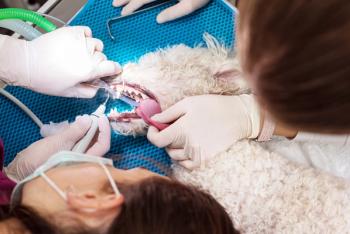
5 steps to reduce the recurrence of bladder stones
Sick of seeing "stoned" cats and dogs at your veterinary practice? Dont pass the chance to stop the strain by preventing recurring bladder stones in dogs and cats.
Pet owners are often surprised to learn their cat or dog is suffering from bladder stones, also known as cystic calculi. While bladder stones may be caused by a variety of underlying conditions, such as chronic urinary tract infections, abnormal metabolism and liver disease, its also possible for otherwise healthy dogs and cats to suffer from this condition. Pets with a history of bladder stones may be more likely to experience a recurrence in the future. The good news: We can educate pet owners to lower a pets risk for a recurrence.
Ultimately, preventing a recurrence will depend on the type of stone a pet has developed and the underlying causes that led to its formation. Understanding which type of stone the pet is prone to forming can help the veterinarian make a treatment plan and more effectively direct any changes to a pets diet or lifestyle.
DIAGNOSIS. Some stones may dissolve with simple diet adjustments, while others may require surgical removal. (Figure 1.)
Figure 1
DIET. Prescription urinary health diets are formulated to reduce the likelihood of crystal/stone formation in the bladder by altering the pH levels of the urine and minimizing levels of specific potential stone forming nutrients. High levels of certain minerals and nutrients may contribute to the formation of cystic calculi in cats and dogsfor example, high oxalate foods should be avoided in pets with a history of calcium oxalate stones. And feeding a pet multiple small meals a day can help to maintain more consistent urine pH levels throughout the day.
SUPPLEMENTS. Remind pet owners to be cautious when using nutritional supplements in pets with a history of cystic calculi, particularly those containing calcium or Vitamins C or D. However, in some instances, veterinarians may recommend supplement options to decrease the incidence of bladder stone recurrence. For example, potassium citrate supplements may be used to help prevent recurrence of calcium oxalate stones.
MORE WATER, MORE WALKS. Increasing a pets water intake helps avoid a buildup of crystals and inflammatory sediment that can contribute to bladder inflammation and stone formation. Owners can help increase a pets water consumption by switching from dry to canned pet food or adding extra water to the pets food. Small pet drinking fountains are widely available at pet stores, and constantly circulating water may be especially enticing to cats. Taking the pet out to urinate more frequently can be beneficial as prolonged urine retention can lead to increased formation of crystals and stones in the bladder. (Figure 2.)
Figure 2
FOLLOW UP. Monitoring changes to a pets urine concentration (USG) and pH (either in the clinic or at home) may provide helpful indicators of the effects of lifestyle or diet changes.
Figure 3
Routine testing of blood and urine (Figure 3) as well as imaging of the bladder (Figure 4)even when the pet isnt showing any clinical signsallow veterinarians to screen for indicators of subclinical bladder health issues that may not be visible or causing symptoms.
Figure 4
Nichole Reyes, DVM, is a veterinarian at Westchase Veterinary Center and Emergency in Tampa, Florida.
Newsletter
From exam room tips to practice management insights, get trusted veterinary news delivered straight to your inbox—subscribe to dvm360.





